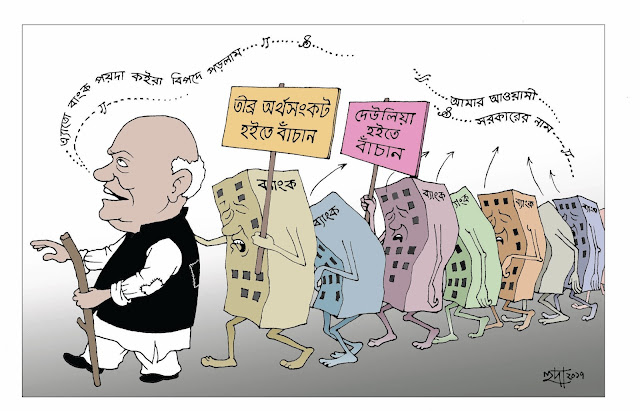Staff Correspondent
A major part of social and economic achievements of the country would be at stake without improvement in governance, observed representatives of development partners, civil society and government high-ups yesterday (Wednesday).
The view came on the first day of a high-level event, Bangladesh Development Forum (BDF), organised by the Ministry of Finance to discuss implementation progress of the 7th Five-Year Plan, the UN-set Sustainable Development Goals (SDGs) and challenges with development partners.
“Any deviation from this combination might jeopardise the unlocking of development potentials of Bangladesh. There is no alternative to improving governance in order for growth to be more sustainable and pro-poor,” said Shamsul Alam, member of the Planning Commission.
He made the comment while presenting the keynote on implementation of the 7th Five-Year Plan and SDGs at a session of the BDF at the Sonargaon Hotel. Finance Minister AMA Muhith chaired the session.
“Governance issue is particularly critical in the use of public resources, service delivery of institutions, transports, law enforcement, judiciary, land administration, tax and customs as they are still deemed corrupt service providers in Bangladesh,” he observed.
“Governance has been and remains one of Bangladesh's most critical challenges. Without addressing it, and more seriously, the government will be at the risk of losing some of the hard-earned economic and social advances it has achieved so far,” said Sir Fazle Hasan Abed, chairperson of Brac, the world's largest NGO.
He said governance should be at the very top of the government's priorities. He added partnership among the government, civil society and private sector can contribute to the next phase of the country's development.
“We must prioritise eradication of extreme poverty in Bangladesh. While one cannot deny the tremendous progress made, there are still 20 million people in our country who are living in direst forms of poverty and deprivation,” said the Brac chairperson.
Rensje Teerink, European Union ambassador to Bangladesh, put emphasis on diversification of export, regional integration, resource mobilisation and economic governance. She said, “We find it incredibly important to emphasise for Bangladesh to improve its overall governance, particularly in Public Financial Management [PFM], anti-corruption, transparency and tax mobilisation.”
The PFM is necessary for a country as it supports good public management by informing decision-makers to use scarce resources more efficiently, improve service delivery, reduce transaction cost and increase accountability of public institutions, she added.
Earlier at the inaugural session, World Bank Vice-President Annette Dixon said Bangladesh has attained impressive progress, but much remains to be done to give all of Bangladesh's citizens the opportunities they deserve. She said Bangladesh needs to address its infrastructure, energy, climate change and urbanisation bottlenecks.
“The country should continue to improve its institutions. The 7th Five-Year Plan importantly emphasises the need to strengthen governance, which includes building a strong civil service, judiciary, public banks, tax collection and Anti-Corruption Commission. We share Bangladesh's stated objective of zero tolerance for corruption.”
Finance Minister AMA Muhith said financing is the biggest challenge to implement SDGs and sought multilateral lenders and donors to enhance their financial and technological cooperation.
Asian Development Bank (ADB) Vice-President Wencai Zhang reaffirmed ADB's commitment to support Bangladesh in achieving the SDGs and assisting the country in fulfilling its growth aspirations.
Zhang said, “The ADB stands ready to support Bangladesh in tackling challenges to meeting the SDGs, improving infrastructure, and boosting social development. Improving education quality, enhancing access to health, and creating more employment opportunities, particularly for women, are some of the challenges to be met to achieve the SDG targets.”
At the keynote session, WB Country Director in Bangladesh Qimiao Fan said there are significant challenges for Bangladesh in going forward. He cited that the pace of poverty reduction and employment creation has slowed down. “We have also seen relatively inequality increasing in recent years.”
UN Resident Coordinator Mia Seppo emphasised addressing inequality and ensuring equality of opportunities, particularly in health and education for all.
- Courtesy: The Daily Star/Jan 18, 2018













